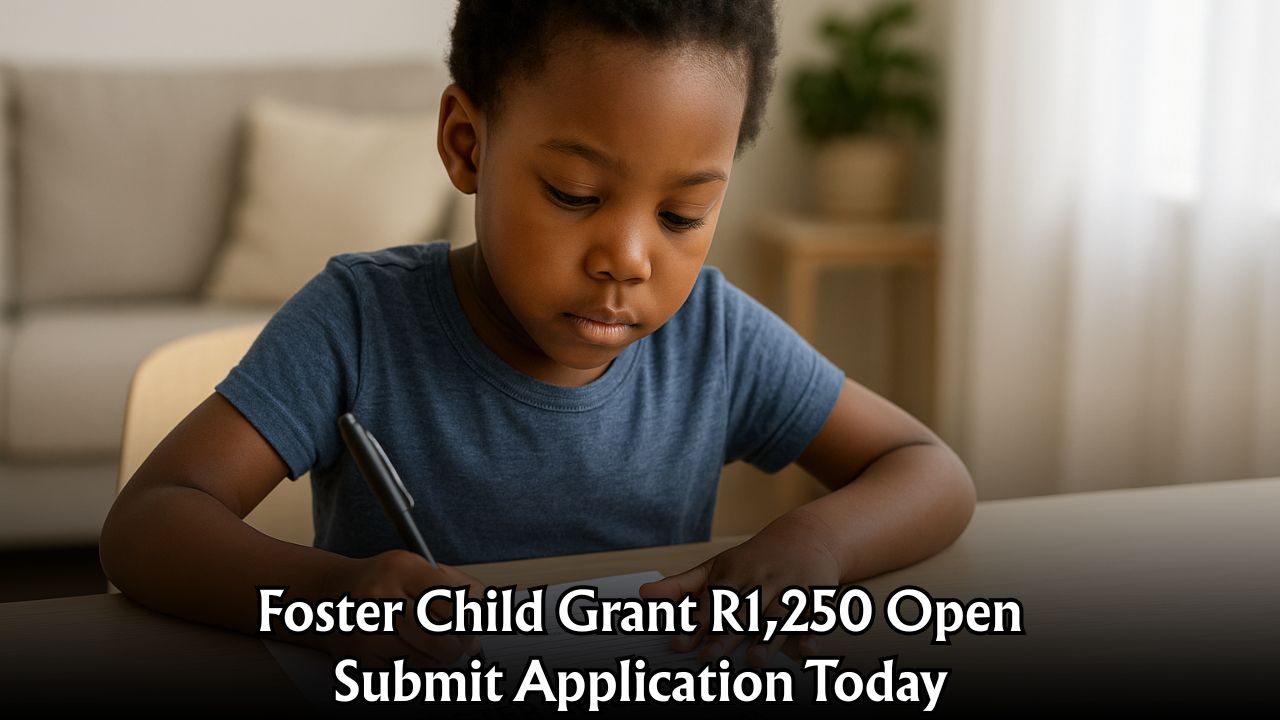Foster Child Grant R1250 Applications – The Foster Child Grant of R1,250 is a critical financial support program aimed at helping foster parents provide better care and stability for children under their guardianship. This grant not only assists with daily living expenses like food, clothing, and education but also ensures that vulnerable children receive the dignity and opportunities they deserve. Applications for the grant are currently open, giving eligible foster parents an important chance to secure financial assistance. Since these grants are processed under strict regulations, applicants must submit accurate details along with all necessary documents to avoid delays or rejections. The application process has been simplified to make it more accessible, but it is essential to apply before the deadline to ensure timely approval. Missing the cut-off date could mean waiting for the next application cycle, which might cause unnecessary financial strain on families. By applying on time, foster parents can secure steady support that significantly improves the well-being of the children in their care.
Who Can Apply for the Foster Child Grant?
The Foster Child Grant is specifically designed for foster parents who have been granted legal guardianship of a child by the court. Applicants must provide proof of the foster care order to qualify for the monthly R1,250 support. This ensures that the funds are reaching genuine cases where children are placed in foster care for their protection and well-being. The grant is not restricted by the foster parent’s income, which makes it accessible to all qualifying guardians regardless of their financial status. The government has emphasized that this grant plays a vital role in helping children grow in safe and supportive environments. Applicants must also provide copies of the child’s birth certificate, the foster care court order, and the guardian’s identification documents. By fulfilling these requirements, foster parents can increase their chances of a smooth approval process, securing timely financial aid to cover the child’s essential needs.
How to Apply for the Foster Child Grant
The application process for the Foster Child Grant has been made more convenient, with options to apply online or directly at the nearest SASSA office. Foster parents are required to fill in the application form carefully, ensuring that no important details are missed. Supporting documents such as the foster care order, child’s birth certificate, and guardian’s ID must be submitted along with the form. In some cases, SASSA may request additional verification to confirm eligibility, so applicants should be prepared for follow-ups. Once the application is submitted, it goes through a review and approval process which may take several weeks. Successful applicants are notified, and payments are directly transferred each month. Applying before the deadline is crucial as late applications can delay payments and leave foster families without essential financial support. Keeping track of application status through official channels ensures applicants stay updated on progress and avoid unnecessary stress.
Deadline Importance and Consequences
The deadline for the Foster Child Grant application is a critical factor that every foster parent must take seriously. Missing the deadline could result in delayed financial support, forcing foster families to manage without the much-needed R1,250 assistance until the next cycle. Since foster children often rely heavily on this grant for their basic needs like school supplies, food, and healthcare, any delay in funding can create a significant burden on families. To avoid such setbacks, applicants are encouraged to prepare all necessary documents in advance and submit their applications well before the closing date. In many cases, last-minute submissions face technical errors or incomplete verification, which can further extend the waiting time. Therefore, being proactive ensures peace of mind and financial stability for the child. SASSA continues to remind applicants that deadlines are non-negotiable, highlighting the importance of timely action in securing uninterrupted financial aid.
Benefits of the Foster Child Grant
The Foster Child Grant provides more than just monthly financial assistance; it also offers emotional and social security to children placed in foster care. The R1,250 grant ensures that guardians can afford better living conditions, nutritious food, education expenses, and even healthcare for the child. This consistent support reduces the financial pressure on foster families and allows them to focus on creating a safe and nurturing environment. Beyond the immediate financial relief, the grant helps foster children feel included and supported, which boosts their confidence and well-being. Studies have shown that children in stable foster care settings have higher chances of success in school and personal development. For guardians, this grant serves as reassurance that the government recognizes and supports their role in raising vulnerable children. Ultimately, the Foster Child Grant is more than just money—it is an investment in the future of children who deserve stability, love, and opportunity.
